小学英语语法之 形容词
中小学英语语法(形容词)
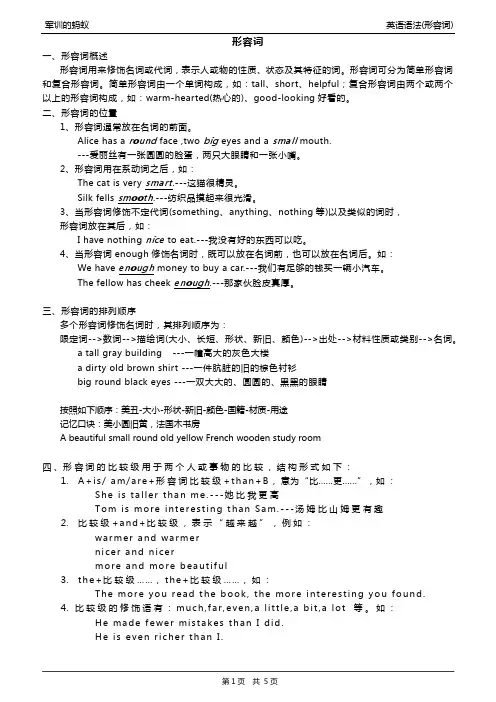
形容词一、形容词概述形容词用来修饰名词或代词,表示人或物的性质、状态及其特征的词。
形容词可分为简单形容词和复合形容词。
简单形容词由一个单词构成,如:tall、short、helpful;复合形容词由两个或两个以上的形容词构成,如:warm-hearted(热心的)、good-looking好看的。
二、形容词的位置1、形容词通常放在名词的前面。
Alice has a round face ,two big eyes and a small mouth.---爱丽丝有一张圆圆的脸蛋,两只大眼睛和一张小嘴。
2、形容词用在系动词之后,如:The cat is very smart.---这猫很精灵。
Silk fells smooth.---纺织品摸起来很光滑。
3、当形容词修饰不定代词(something、anything、nothing等)以及类似的词时,形容词放在其后,如:I have nothing nice to eat.---我没有好的东西可以吃。
4、当形容词enough修饰名词时,既可以放在名词前,也可以放在名词后。
如:We have enough money to buy a car.---我们有足够的钱买一辆小汽车。
The fellow has cheek enough.---那家伙脸皮真厚。
三、形容词的排列顺序多个形容词修饰名词时,其排列顺序为:限定词-->数词-->描绘词(大小、长短、形状、新旧、颜色)-->出处-->材料性质或类别-->名词。
a tall gray building ---一幢高大的灰色大楼a dirty old brown shirt ---一件肮脏的旧的棕色衬衫big round black eyes ---一双大大的、圆圆的、黑黑的眼睛按照如下顺序:美丑-大小-形状-新旧-颜色-国籍-材质-用途记忆口诀:美小圆旧黄,法国木书房A beautiful small round old yellow French wooden study room四、形容词的比较级用于两个人或事物的比较,结构形式如下:⒈A+i s/a m/a r e+形容词比较级+t h a n+B,意为“比......更......”,如:S h e i s t a l l e r t h a n m e.---她比我更高T o m i s m o r e i n t e r e s t i n g t h a n S a m.---汤姆比山姆更有趣⒉比较级+a n d+比较级,表示“越来越”,例如:w a r m e r a n d w a r m e rn i c e r a n d n i c e rm o r e a n d m o r e b e a u t i f u l⒊t h e+比较级……,t h e+比较级……,如:T h e m o r e y o u r e a d t h e b o o k,t h e m o r e i n t e r e s t i n g y o u f o u n d.⒋比较级的修饰语有:m u c h,f a r,e v e n,a l i t t l e,a b i t,a l o t等。
小学六年级英语语法知识形容词
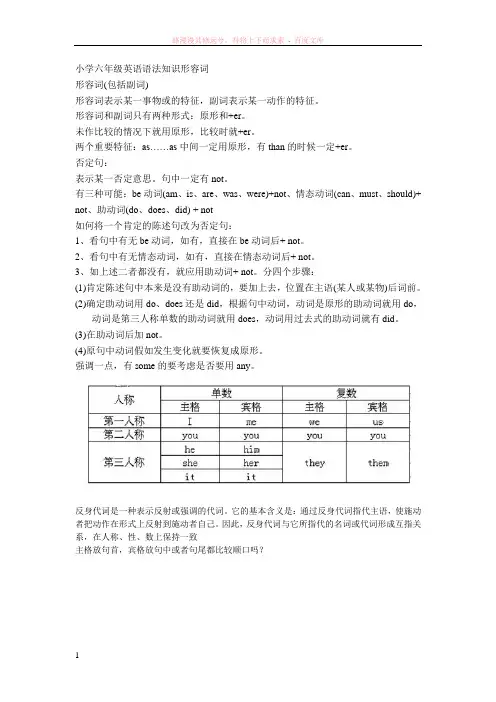
小学六年级英语语法知识形容词形容词(包括副词)形容词表示某一事物或的特征,副词表示某一动作的特征。
形容词和副词只有两种形式:原形和+er。
未作比较的情况下就用原形,比较时就+er。
两个重要特征:as……as中间一定用原形,有than的时候一定+er。
否定句:表示某一否定意思。
句中一定有not。
有三种可能:be动词(am、is、are、was、were)+not、情态动词(can、must、should)+ not、助动词(do、does、did) + not如何将一个肯定的陈述句改为否定句:1、看句中有无be动词,如有,直接在be动词后+ not。
2、看句中有无情态动词,如有,直接在情态动词后+ not。
3、如上述二者都没有,就应用助动词+ not。
分四个步骤:(1)肯定陈述句中本来是没有助动词的,要加上去,位置在主语(某人或某物)后词前。
(2)确定助动词用do、does还是did,根据句中动词,动词是原形的助动词就用do,动词是第三人称单数的助动词就用does,动词用过去式的助动词就有did。
(3)在助动词后加not。
(4)原句中动词假如发生变化就要恢复成原形。
强调一点,有some的要考虑是否要用any。
反身代词是一种表示反射或强调的代词。
它的基本含义是:通过反身代词指代主语,使施动者把动作在形式上反射到施动者自己。
因此,反身代词与它所指代的名词或代词形成互指关系,在人称、性、数上保持一致主格放句首,宾格放句中或者句尾都比较顺口吗?时态是谓语动词所表示的动作或情况发生时间的各种形式.英语动词有16种时态,但是常见的只有九种:一般现在时、一般过去时、一般将来时、现在进行时、过去进行时、现在完成时、过去完成时,过去将来时,现在完成进行时。
常用的时态只有八种。
1.一般现在时的用法1)表示经常性、习惯性的动作;表示现在的状态、特征和真理.句中常用often,usually,every day等时间状语。
小学英语语法详解--形容词
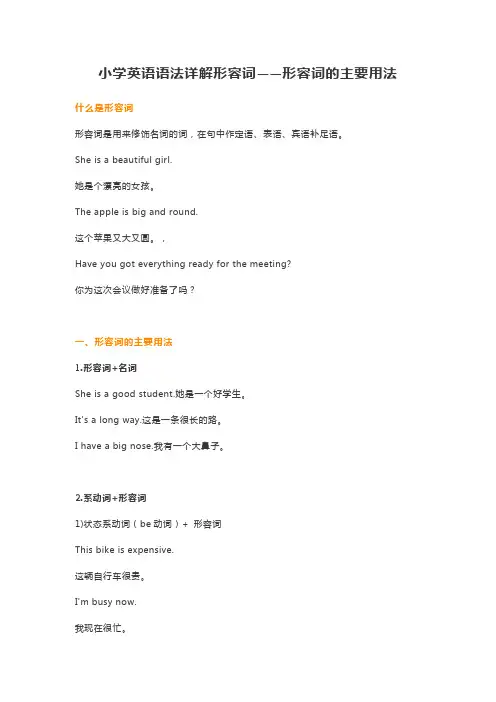
小学英语语法详解形容词——形容词的主要用法什么是形容词形容词是用来修饰名词的词,在句中作定语、表语、宾语补足语。
She is a beautiful girl.她是个漂亮的女孩。
The apple is big and round.这个苹果又大又圆。
,Have you got everything ready for the meeting?你为这次会议做好准备了吗?一、形容词的主要用法1.形容词+名词She is a good student.她是一个好学生。
It's a long way.这是一条很长的路。
I have a big nose.我有一个大鼻子。
2.系动词+形容词1)状态系动词(be动词)+ 形容词This bike is expensive.这辆自行车很贵。
I'm busy now.我现在很忙。
They are happy together.他们在一起很开心。
2)持续系动词+形容词He always keeps silent at meeting.他开会时总保持沉默。
The shop stays open till eight o'clock.商店开到八点。
3)表象系动词+形容词He looks tired.他看起来很累。
He seems(to be)very sad.他看起来很伤心。
4)感官系动词+形容词The scarf feels very soft.这条围巾手感很软。
This flower smells nice.这朵花闻起来很香。
5)变化系动词+形容词The leaves turn green.叶子变绿了。
The egg becomes bigger.蛋变大了。
学习小贴士:●在英语单词中something, anything, nothing等不定代词被形容词修饰时,形容词放在不定代词后面。
I have something important to tell you.我有重要的事要告诉你。
小学英语语法-形容词
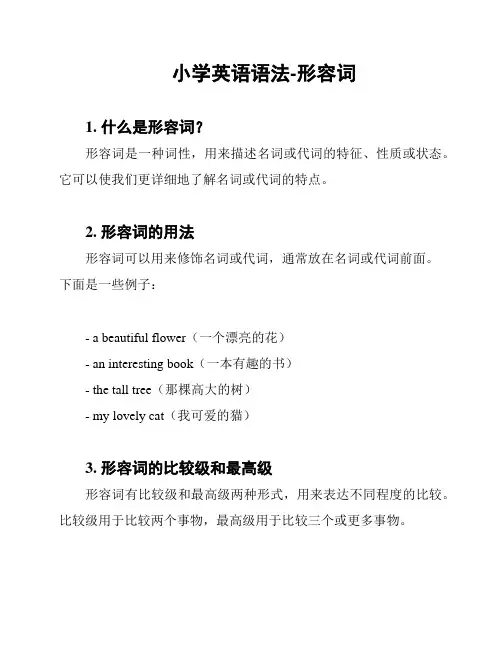
小学英语语法-形容词1. 什么是形容词?形容词是一种词性,用来描述名词或代词的特征、性质或状态。
它可以使我们更详细地了解名词或代词的特点。
2. 形容词的用法形容词可以用来修饰名词或代词,通常放在名词或代词前面。
下面是一些例子:- a beautiful flower(一个漂亮的花)- an interesting book(一本有趣的书)- the tall tree(那棵高大的树)- my lovely cat(我可爱的猫)3. 形容词的比较级和最高级形容词有比较级和最高级两种形式,用来表达不同程度的比较。
比较级用于比较两个事物,最高级用于比较三个或更多事物。
- 比较级的构成:形容词原形 + er,例如:taller(更高的),bigger(更大的)- 最高级的构成:形容词原形 + est,例如:tallest(最高的),biggest(最大的)下面是一些使用比较级和最高级的例子:- This book is more interesting than that one.(这本书比那本书更有趣。
)- This is the tallest building in the city.(这是这座城市最高的建筑。
)4. 形容词的修饰范围形容词不仅可以修饰名词或代词,还可以修饰整个句子。
这时,形容词通常放在句子的最前面,用来表达说话人的感受或观点。
下面是一些使用形容词修饰句子的例子:- Amazingly, he finished the race in record time.(令人惊讶的是,他以创纪录的时间完成了比赛。
)- Unfortunately, the concert was canceled due to bad weather.(不幸的是,由于天气不好,音乐会被取消了。
)5. 形容词的数量和位置当形容词用于修饰复数名词时,通常位于名词的前面,并在形容词和名词之间加上 "s"。
小学英语语法形容词和副词详细讲解

形容词的用法
1)形容词在句子中通常放在名词前面,形 容词+名词,含有“······的”意思。如:
a clever boy 一个聪明的男孩 a blue car 一辆蓝色的汽车 注意:形容词在修饰someone, somebody,
something, anything, nothing等不定代词时, 需要置于其后。如: something important 重要的事情 nothing interesting没有什么有趣的事
2.I am very busy.(修饰形容词) 3.He runs too quickly .(修饰副词) 4.We play happily. (修饰动词)
⑤通常在形容词后加-ly变成副词。
slow → s_l_o_w__ly_ real → re_a_l_ly___
usual →u_s_u__a_ll_y careful→ca_r_e_f_u_l_ly easy →e_a_s_il_y__ happy→ha_p_p_i_ly__ heavy →h_e__a_v_il_y angry→an_g_r_i_ly__
星期日 星期一 星期二 星期三 星期四 星期五 星期六
always 100%
usually 75% often 50%
sometimes 25%
seldom 5%
never 0%
4)程度副词:表示程度的深浅
much 很,非常 very 非常
little很少
too 太
quite十分
5)疑问副词:用来引导一个特殊疑问 句。
用来修饰动词、形容词、其他副词,可表 示时间、地点、程度、状态等。如:
1The wind is blowing strongly.风刮的很大。 (副词strongly修饰动词blow,表示程度。)
小学英语语法 形容词副词
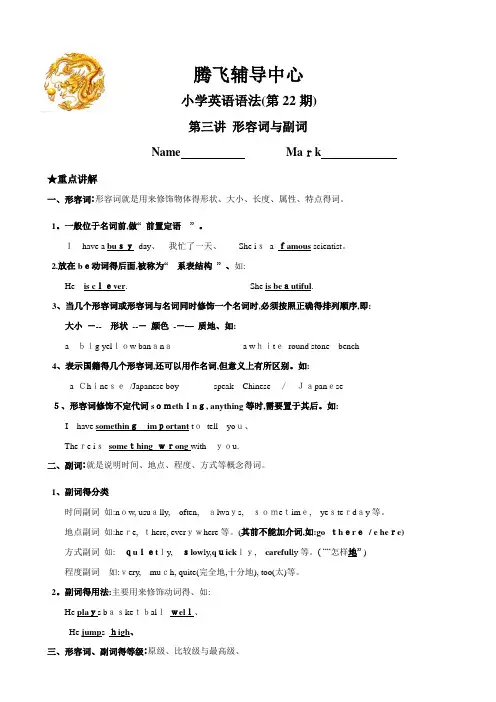
腾飞辅导中心小学英语语法(第22期)第三讲形容词与副词Name Mark★重点讲解一、形容词:形容词就是用来修饰物体得形状、大小、长度、属性、特点得词。
1。
一般位于名词前,做“ 前置定语” 。
Ihave a busyday、我忙了一天、She isa famous scientist。
2.放在be动词得后面,被称为“系表结构” 、如:He is clever. She is beautiful.3、当几个形容词或形容词与名词同时修饰一个名词时,必须按照正确得排列顺序,即:大小---形状---颜色--—质地、如:abig yellow banana a whiteround stone bench4、表示国籍得几个形容词,还可以用作名词,但意义上有所区别。
如:a Chinese/Japanese boy speak Chinese/Japanese5、形容词修饰不定代词something, anything等时,需要置于其后。
如:I have somethingimportant totell you、There issomething wrong withyou.二、副词:就是说明时间、地点、程度、方式等概念得词。
1、副词得分类时间副词如:now, usually,often,always,sometime,yesterday等。
地点副词如:here, there, everywhere等。
(其前不能加介词,如:go there/ e here)方式副词如:quietly,slow ly,quickly,careful ly等。
( ““怎样地” )程度副词如:very,much, quite(完全地,十分地), too(太)等。
2。
副词得用法:主要用来修饰动词得、如:He plays basketballwell、He jump shigh、三、形容词、副词得等级:原级、比较级与最高级、1、原级得用法肯定句:主语+ be动词+as + 原级+as 。
小学英语语法 形容词的分类(形容词的主要用法)
g.描述材质wooden, silk...
小学英语语法形容词的分
形容词的主要用法
什么是形容词
形容词是用来修饰名词的词,在句中作定语、表语、宾语补足语。
She is a beautiful girl.
她是个漂亮的女孩。
The apple is big and round.
这个苹果又大又圆。,
Have you got everything ready for the meeting?
5)变化系动词+形容词
The leaves turn green.
叶子变绿了。
The egg becomes bigger.
蛋变大了。
学习小贴士:
●在英语单词中something, anything, nothing等不定代词被形容词修饰时,形容词放在不定代词后面。
I have something important to tell you.
我有重要的事要告诉你。
Is there anything wrong with you?
你有什么不对劲吗?
There is nothing dangerous here.
这儿一点都不危险。
●形容词作定语一般放在被修饰的名词之前。如果有两个或两个以上的形容词修饰一个名词时,则由它们和被修饰的名词之间的密切程度而定,越密切的形容词越靠近名词。在小学阶段,我们可以记住一个口诀:
商店开到八点。
3)表象系动词+形容词
He looks tired.他看起来很累。
He seems(to be)very sad.他看起来很伤心。
4)感官系动词+形容词
The scarf feels very soft.
小学英语语法形容词(整理版)
小学英语语法总复习 第四讲形容词
小学英语语法
ቤተ መጻሕፍቲ ባይዱ
形容词比较级和最高级变化规则:
单 音 节 和 少 数 双 音 节 单 词 构成 一般词尾加-er, -est 原级 tall long nice large big hot fat thin heavy busy early easy 比较级 taller longer nicer larger bigger hotter fatter thinner heavier busier earlier easier 最高级 tallest longest nicest largest biggest hottest fattest thinnest heaviest busiest earliest easiest
以字母e结尾的形容词 或副词,直接加-r,-st 以重读闭音节结尾的 形容词或副词,如末尾 只有一个辅音字母,双 写该字母,再加-er,-est 以“辅音字母+y”结尾 的形容词或副词,把y 变为i,再加-er,-est
小学英语语法
不规则变化的形容词: little / few - less (比较级)- least(最高级) good - better(比较级) - best(最高级) bad - worse(比较级) - worst(最高级) 另外多音节词,在多音节词前加more 如:beautiful--more beautiful, expensive-more expensive
小学英语语法
old_______ young______ tall_______ long______short________strong______ big________small_______fat_________ thin_______heavy______ light________ nice_______good_______ beautiful______________low________ high_______slow_______ fast________ late________early______far_________ well_______
小学英语语法详解形容词--形容词的原级,比较级和最高级的用法
小学英语语法详解形容词——形容词的原级,比较级和最高级的用法一、形容词的比较级和最高级绝大多数形容词有三种形式,原级、比较级和是高级,表示形容词说明的性质在程度上的不同。
形容词的比较极和最高级形式是在形容词原级形式的基础上变化的,分为规则变化和不规则变化。
1.规则变化3) 以-y结尾,但-y前是辅音字母的形容词的比较级和最高级是把-y 去掉,加上 -ier4)以重读闭音节 + 辅音字母结尾的形容词的比较级和最高级是双写该辅音字母燃后再5)双音节和多音节形容词的比较级和最高级需用more和the most 加在形容词前面来Aaron老师的小提醒:★有些形容词的比较级和最高级,可以有两种表示法:clever—cleverer, cleverest 或者more clever, the most cleverfriendly—friendlier,friendliest 或者more friendly , the most friendly★形容词前如加less和least 则表示"较不"和"最不":important 重要,less important 较不重要,least important 最不重要。
二、形容词的原级,比较级和最高级的用法1.形容词的原级1)形容词的原级一般用在同级比较的情况较多,两个比较对象程度相同的,用“as + 形容词原级+as 的结构”Tom is as tall as his brothe.汤姆和他的哥哥一样高。
My hair is as long as hers.我的头发和她的一样长。
His shoes are as new as mine.他的鞋子和我的一样新。
在这两种结构中,第一个as是副词,而第二个as 是连词,一般后面接名词、代词或所有格。
2)如果表示“……不如……”则用“not so / as +形容词原级+as的结构”His bedroom is not as big as his sister's.他的房间不如他姐姐的大。
小学英语语法——形容词与副词知识点讲解+练习
形容词和副词一、形容词、副词概述1、形容词定义:形容词(adjective),简称adj,用来修饰名词或代词,表示人或事物的性质、状态和特征。
2、副词定义:副词(adverb),简称adv,用来修饰动词、形容词或副词,表示时间、频率、范围、语气、程度等。
二、形容词、副词考点纵览三、综合练习( ) 1. How beautifully she sings! I have never heard _____ voice.A. a betterB. a bestC. the betterD. the best ( ) 2. She looks very _____ but I can’t remember her name.A. similarB. familiarC. friendlyD. strange ( ) 3. Children all looked _____ at the broken model plane and felt quite _____.A. sad; sadB. sadly; sadlyC. sad; sadlyD. sadly; sad( ) 4. The child dreamed that he had once lived in a _______ house in the forest.A. wooden pretty littleB. little pretty woodenC. pretty little woodenD. wooden little pretty( ) 5. ---Which team is _______ to win the game?---I don’t know, but I’ve found _______ for ours to win.A. probable; it unlikelyB. likely; it possibleC. possible; it possibleD. likely; it possibly( ) 6. With the development of the Internet, _______ communication is done by regular mail.A. lessB. moreC. littleD. few( ) 7. ---If you don’t like the red coat, take the blue one.---OK, but do you have ______ size in blue? This one’s a bit tight for me.A. a bigB. a biggerC. the bigD. the bigger( ) 8. If there were no examinations, we should have ______ at school.A. the happiest timeB. a more happier timeC. much happiest timeD. a much happier time( ) 9. This dress is prettier, but it costs ______ that one.A. twice more thanB. twice as much asC. as much twice asD. twice so much as( ) 10.________students are required to take part in the boat race.A. Ten strong young ChineseB. Ten Chinese strong youngC. Chinese ten young strongD. Young strong ten Chinese( ) 11. Allen had to call a taxi because the box was ____to carry all the way home.A. much too heavyB. too much heavyC. heavy too muchD. too heavy much( ) 12. Our neighbor has ________ours.A. as a big house asB. as big a house asC. the same big house asD. a house the same big as( ) 13. We were in ________when we left that we forgot the airline tickets.A. a rush so anxiousB. a such anxious rushC. so an anxious rushD. such an anxious rush( ) 14. ---I was riding along the street and all of a sudden, a car cut in and knocked me down.---You can never be ________careful in the street.A. muchB. veryC. soD. too( ) 15. ---You don’t look very ________.Are you ill?---No,I’m just a bit tired.A. goodB. wellC. strongD. healthy( ) 16. Four of Robert’s children were at the party,including ________, Luke.A. the eldestB. an oldest oneC. the oldD. an old one( ) 17. Many students signed up for the ________race in the sports meeting to be held next week.A. 800-metre-longB. 800-metres-longC. 800 metre lengthD. 800 metres length( ) 18. It’s always difficult being in a foreign country,________if you don’t speak the language.A. extremelyB. naturallyC. basicallyD. especially( ) 19. In recent years,travel companies have succeeded in selling us the idea that the further we go,__________.A. our holiday will be betterB. our holiday will be the betterC. the better our holiday will beD. the better will our holiday be( ) 20. When he heard a cry for help, he ran out as ________ as he could.A. hardlyB. quicklyC. finallyD. slowly( ) 21. “Our team is _____ to win the match.” “Really? But I don’t think so.”A. easyB. difficultC. possibleD. sure( ) 22. A ______ road goes ______ from one place to another.A. straight; straightB. straightly; straightlyC. straight; straightlyD. straightly; straight( ) 23. “This book is ______ more useful for us students.” “Yes, but it is _______ too difficult.”A. quite; quiteB. much; ratherC. rather; quite D quite; much( ) 24. There was a ______ change in the weather, and the rain came pouring down.A. quickB. slowC. fastD. sudden( ) 25. You can speak ______ in front of him, but you can’t eat ______ in his restaurant.A. freely; freelyB. free; freelyC. freely; freeD. free; free( ) 26. Tom will not be at the picnic, ______ to the family’s disappointment.A. muchB. moreC. too muchD. much more( ) 27. --- I have seen so little of Mike ______. Is he away on business?--- Oh, no. He just leaves for his office early and comes back very ______.A. later; latelyB. later; laterC. lately; lateD. late; lately( ) 28. From his ______ voice on the phone I know everything is well under way.A. satisfactoryB. satisfyingC. satisfiedD. satisfaction( ) 29. In ______ Chinese culture, marriage decisions were often made by parents for their children.A. traditionalB. historicC. peacefulD. civil( ) 30. The houses in the village are ______ built of wood and hay.A. mostB. almostC. nearlyD. mostly( ) 31. --- What do people wear when they go to the theatre?--- Well, it isn’t very ______. People can wear anything they like.A. normalB. certainC. modernD. simple( ) 32. Mary’s biology is ______ than ______ in the class.A. a lot of better; anyone else’sB. far better; anyone’s else’sC. much better; anyone elseD. a lot better; anyone else’s( ) 33. We decided not to climb the mountains because it was raining ____.A. badlyB. hardlyC. stronglyD. heavily( ) 34. Paris is one of _____ cities in the world.A. more beautifullyB. more beautifulC. the most beautifullyD. the most beautiful ( ) 35. Are you going to leave______?A. the open windowsB. the windows openingC. the windows openD. the windows opened( ) 36. Bob never does his homework _____ Mary, so he makes lots of mistakes.A. so careful asB. as carefully asC. carefully asD. as careful as.( ) 37. My sister is good at sports. She can jump ____ than me.A. highestB. very highC. too highD. much higher ( ) 38. When spring comes, the trees get ____.A. green and greenB. green and greenerC. greener and greenD. greener and greener( ) 39.He works very ___________.He _____________has a rest on Sundays.A. hard; hardlyB. hardly; hardC. hard; hardD. hardly; hardly( ) 40.He learns Russian_____________.A. goodB. niceC. wellD. fine( ) 41.The boy didn’t run______________ to catch the bus.A. fast enoughB. enough fastC. quick enoughD. enough quickly ( ) 42.Eating _____________ is bad for our health.A. much tooB. too muchC. too moreD. too many( ) 43.Have you ever seen ______________ big panda before?A. a suchB. such aC. so aD. as( ) 44.He looks very _____________ today.A. worriedB. worryC. worryingD. to worry( ) 45.Listen to me. I have _____________ to tell you.A. important somethingB. important anythingC. something importantD. anything important( ) 46. ---How ___ can you finish the drawing?--- In ten minutes.A. longB. often.C. soonD. rapid( ) 47. This book is _____ worth seeing again.A. veryB. quiteC. wellD. much( ) 48. My _____ brother is three years ____ than I .A. old; olderB. elder; olderC. older; elderD. old; elder( ) 49. We felt ___ after we watched the ___ football match.A. exciting; excitedB. excited; excitingC. excited; excitedD. exciting; exciting( ) 50. The old man lived ____ in the house, but he didn’t feel___.A. lonely; lonelyB. alone; lonelyC. alone; aloneD. lonely; alone小学英语语法——形容词与副词知识点讲解+练习参考答案1. A2.B3.D4.C5.B6.A7.B8.D9.B 10.A 11. A 12.B 13.D 14.D 15.B 16.A 17.A 18.D 19.C 20.B 21. D 22.A 23.B 24.D 25.C 26.A 27.C 28.C 29.A 30.D 31. B 32.D 33.D 34.D 35.C 36.B 37.D 38.D 39.A 40.C 41. A 42.B 43.B 44.A 45.C 46.C 47.C 48.B 49.B 50.B11。
- 1、下载文档前请自行甄别文档内容的完整性,平台不提供额外的编辑、内容补充、找答案等附加服务。
- 2、"仅部分预览"的文档,不可在线预览部分如存在完整性等问题,可反馈申请退款(可完整预览的文档不适用该条件!)。
- 3、如文档侵犯您的权益,请联系客服反馈,我们会尽快为您处理(人工客服工作时间:9:00-18:30)。
小学英语语法之形容
词
-CAL-FENGHAI.-(YICAI)-Company One1
英语语法之形容词
形容词是用来修饰或描述名词(或代词),表示人或事物性质、状态和特征的词。
、
一、形容词的分类:
简单形容词 e.g. big, small, windy, cold, fine, black, old, happy…
复合形容词 e.g. good-looking, kind-hearted, warm-hearted
二、形容词的位置
1.通常放在形容词前面
Alice is a good student at school.
2.用在系动词的后面
Joyce’s dress is nice.
3.用在不定代词后面
There is something wrong with the watch.
三、形容词的排列顺序
描绘形容词→大小(长短高低)形容词→形状形容词→年龄(新旧)形容词→颜色形容词→国籍形容词→材料形容词→用途(类别)形容词→名词
a tall fat English teacher
四、形容词的比较等级
1.形容词的三个比较等级: 原级,比较级,最高级
表示二者相比“等于”时用原级;二者比较有优势之分时用比较级;三者或三者以上的比较“最……”的最高级。
2.形容词比较级的构成
TEST写出下列单词的比较及最高级
long______________________ good_______________________
busy______________________ big________________________
beautiful_________________________ late_________________________
3.形容词比较级的用法
原级
用于两个人或事物的比较,常用结构:“as+形容词原级+as”意为“和……
一样”
Joyce is as tall as Alice.
比较级用于两个人或事物的比较,其形式为“形容词比较级+than”,意为“比……更……”
English is easier than math.
最高级用于三个或三个以上事物之间的比较,其形式为“the+形容词最高级+比较范围”,意思为“最……”
Lucy is the eldest in the classroom.
TEST 用所给词的适当形式填空
1.This is _______________pear on the tree.(big)
2.My aunt is getting ___________and ____________.(fat)
3.Nancy is ______________girl in my class.(beautiful)。
